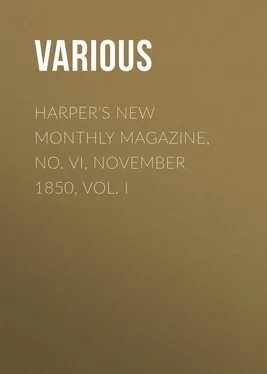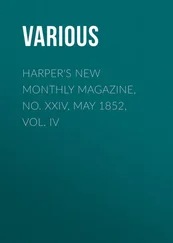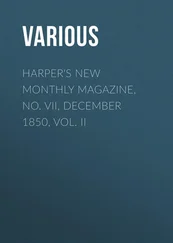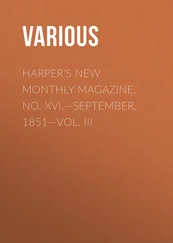Various - Harper's New Monthly Magazine, No. VI, November 1850, Vol. I
Здесь есть возможность читать онлайн «Various - Harper's New Monthly Magazine, No. VI, November 1850, Vol. I» — ознакомительный отрывок электронной книги совершенно бесплатно, а после прочтения отрывка купить полную версию. В некоторых случаях можно слушать аудио, скачать через торрент в формате fb2 и присутствует краткое содержание. Издательство: Иностранный паблик, Жанр: periodic, foreign_edu, на английском языке. Описание произведения, (предисловие) а так же отзывы посетителей доступны на портале библиотеки ЛибКат.
- Название:Harper's New Monthly Magazine, No. VI, November 1850, Vol. I
- Автор:
- Издательство:Иностранный паблик
- Жанр:
- Год:неизвестен
- ISBN:нет данных
- Рейтинг книги:5 / 5. Голосов: 1
-
Избранное:Добавить в избранное
- Отзывы:
-
Ваша оценка:
- 100
- 1
- 2
- 3
- 4
- 5
Harper's New Monthly Magazine, No. VI, November 1850, Vol. I: краткое содержание, описание и аннотация
Предлагаем к чтению аннотацию, описание, краткое содержание или предисловие (зависит от того, что написал сам автор книги «Harper's New Monthly Magazine, No. VI, November 1850, Vol. I»). Если вы не нашли необходимую информацию о книге — напишите в комментариях, мы постараемся отыскать её.
Harper's New Monthly Magazine, No. VI, November 1850, Vol. I — читать онлайн ознакомительный отрывок
Ниже представлен текст книги, разбитый по страницам. Система сохранения места последней прочитанной страницы, позволяет с удобством читать онлайн бесплатно книгу «Harper's New Monthly Magazine, No. VI, November 1850, Vol. I», без необходимости каждый раз заново искать на чём Вы остановились. Поставьте закладку, и сможете в любой момент перейти на страницу, на которой закончили чтение.
Интервал:
Закладка:
Конец ознакомительного фрагмента.
Текст предоставлен ООО «ЛитРес».
Прочитайте эту книгу целиком, купив полную легальную версию на ЛитРес.
Безопасно оплатить книгу можно банковской картой Visa, MasterCard, Maestro, со счета мобильного телефона, с платежного терминала, в салоне МТС или Связной, через PayPal, WebMoney, Яндекс.Деньги, QIWI Кошелек, бонусными картами или другим удобным Вам способом.
1
This sketch of Revolutionary scenes and incidents in and about Boston, is part of an unpublished chapter from Lossing's "Pictorial Field Book of the Revolution," now in course of publication by Harper and Brothers.
2
The following is a copy of the inscription:
3
The following is a copy of the inscription:
"Sacred to the Liberty and the Rights of Mankind!!! The Freedom and Independence of America – sealed and defended with the blood of her sons – This Monument is erected by the Inhabitants of Lexington, under the patronage and at the expense of the Commonwealth of Massachusetts, to the memory of their Fellow-citizens, Ensign Robert Monroe, Messrs. Jonas Parker, Samuel Hadley, Jonathan Harrington, jun., Isaac Muzzy, Caleb Harrington, and John Brown, of Lexington, and Asahel Porter, of Woburn, who fell on this Field, the first victims of the Sword of British Tyranny and Oppression, on the morning of the ever-memorable Nineteenth of April, An. Dom. 1775. The Die was Cast!!! The blood of these Martyrs in the Cause of God and their Country was the Cement of the Union of these States, then Colonies, and gave the Spring to the Spirit, Firmness, and Resolution of their Fellow-citizens. They rose as one man to revenge their Brethren's blood, and at the point of the Sword to assert and defend their native Rights. They nobly dared to be Free!!! The contest was long, bloody, and affecting. Righteous Heaven approved the Solemn Appeal; Victory crowned their Arms, and the Peace, Liberty, and Independence of the United States of America was their glorious Reward. Built in the year 1799."
4
The seventy-fifth anniversary of the battles of Lexington and Concord was celebrated at the latter place on the 19th of April, 1850. In the procession was a carriage containing these venerable brothers, aged, respectively, nearly ninety-one and ninety-three; Amos Baker, of Lincoln, aged ninety-four; Thomas Hill, of Danvers, aged ninety-two; and Dr. Preston, of Billerica, aged eighty-eight. The Honorable Edward Everett, among others, made a speech on the occasion, in which he very happily remarked, that "it pleased his heart to see those venerable men beside him; and he was very much pleased to assist Mr. Jonathan Harrington to put on his top coat a few minutes ago. In doing so, he was ready to say, with the eminent man of old, 'Very pleasant art thou to me, my brother Jonathan!'"
5
Records of Harvard College.
6
Phillis wrote a letter to General Washington in October, 1775, in which she inclosed a poem eulogistic of his character. In February following the general answered it. I give a copy of his letter, in illustration of the excellence of the mind and heart of that great man, always so kind and courteous to the most humble, even when pressed with arduous public duties.
"Cambridge, February 28, 1776."Miss Phillis – Your favor of the 26th of October did not reach my hands till the middle of December. Time enough, you will say, to have given an answer ere this. Granted. But a variety of important occurrences, continually interposing to distract the mind and withdraw the attention, I hope will apologize for the delay, and plead my excuse for the seeming but not real neglect. I thank you most sincerely for your polite notice of me in the elegant lines you inclosed; and however undeserving I may be of such encomium and panegyric, the style and manner exhibit a striking proof of your poetical talents; in honor of which, and as a tribute justly due to you, I would have published the poem, had I not been apprehensive that, while I only meant to give the world this new instance of your genius, I might have incurred the imputation of vanity. This, and nothing else, determined me not to give it a place in the public prints. If you should ever come to Cambridge, or near head-quarters, I shall be happy to see a person so favored by the Muses, and to whom nature has been so liberal and beneficent in her dispensations. I am, with great respect, your obedient, humble servant, Geo. Washington."
7
She thus writes respecting her removal from a peasant's house on Winter Hill to Cambridge, and her residence there:
"We passed three weeks in this place, and were then transferred to Cambridge, where we were lodged in one of the best houses of the place, which belonged to Royalists. Seven families, who were connected by relationship, or lived in great intimacy, had here farms, gardens, and splendid mansions, and not far off, orchards, and the buildings were at a quarter of a mile distant from each other. The owners had been in the habit of assembling every afternoon in one or another of these houses, and of diverting themselves with music or dancing, and lived in affluence, in good humor, and without care, until this unfortunate war at once dispersed them, and transformed all their houses into solitary abodes, except two, the proprietors of which were also soon obliged to make their escape…
"On the 3d of June, 1778, I gave a ball and supper, in celebration of my husband's birthday. I had invited all our generals and officers and Mr. and Mrs. Carter. General Burgoyne sent us an apology, after he had made us wait for him till eight o'clock. He had always some excuse for not visiting us, until he was about departing for England, when he came and made me many apologies, to which I made no other reply than that I should be extremely sorry if he had put himself to any inconvenience for our sake. The dance lasted long, and we had an excellent supper, to which more than eighty persons sat down. Our yard and garden were illuminated. The king's birth-day falling on the next day, it was resolved that the company should not separate before his Majesty's health was drank; which was done, with feelings of the liveliest attachment to his person and interests. Never, I believe, was 'God Save the King' sung with more enthusiasm, or with feelings more sincere. Our two eldest girls were brought into the room to see the illumination. We were all deeply moved, and proud to have the courage to display such sentiments in the midst of our enemies. Even Mr. Carter could not forbear participating in our enthusiasm." Mr. Carter was the son-in-law of General Schuyler. Remembering the kindness which she had received from that gentleman while in Albany, the baroness sought out Mr. and Mrs. Carter (who were living in Boston), on her arrival at Cambridge. "Mrs. Carter," she says, "resembled her parents in mildness and goodness of heart, but her husband was revengeful and false." The patriotic zeal of Mr. Carter had given rise to foolish stories respecting him. "They seemed to feel much friendship for us," says Madame De Riedesel; "though, at the same time, this wicked Mr. Carter, in consequence of General Howe's having burned several villages and small towns, suggested to his countrymen to cut off our generals' heads, to pickle them, and to put them in small barrels, and, as often as the English should again burn a village, to send them one of these barrels; but that cruelty was not adopted." — Letters and Memoire relating to the War of American Independence, by Madame De Riedesel. .
Читать дальшеИнтервал:
Закладка:
Похожие книги на «Harper's New Monthly Magazine, No. VI, November 1850, Vol. I»
Представляем Вашему вниманию похожие книги на «Harper's New Monthly Magazine, No. VI, November 1850, Vol. I» списком для выбора. Мы отобрали схожую по названию и смыслу литературу в надежде предоставить читателям больше вариантов отыскать новые, интересные, ещё непрочитанные произведения.
Обсуждение, отзывы о книге «Harper's New Monthly Magazine, No. VI, November 1850, Vol. I» и просто собственные мнения читателей. Оставьте ваши комментарии, напишите, что Вы думаете о произведении, его смысле или главных героях. Укажите что конкретно понравилось, а что нет, и почему Вы так считаете.












